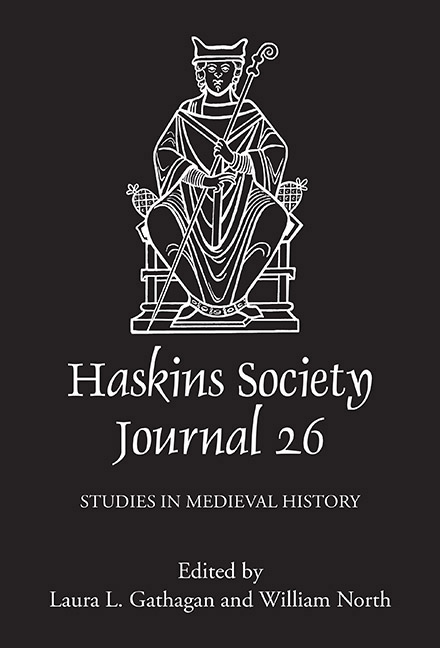Book contents
- Frontmatter
- Contents
- List of Figures
- Editors’ Note
- Abbreviations
- 1 Mores Tuos Fabricae Loquuntur Building Activity and the Rhetoric of Power in Ostrogothic Italy
- 2 A Hermeneutical Feast: Interreligious Dining in Early Medieval Conciliar Legislation
- 3 A Hypothetical Slave in Constantinople: Amalarius’s Liber Officialis and the Mediterranean Slave Trade
- 4 Welsh Kings at Anglo-Saxon Royal Assemblies (928–55)
- 5 The Diplomatics of Depredation: Reconsidering Holy Trinity Caen’s List of Losses
- 6 When Did Robert of Torigni First Receive Henry of Huntingdon’s Historia Anglorum, and Why Does It Matter?
- 7 A Coin Bearing Testimony to Duchess Matilda as Consors Regni
- 8 Fighting to be the Tallest Dwarf: Invidia and Competition in the Self-Conception of Eleventh- and Twelfth-Century Masters
- 9 Brut y Tywysogion: the History of the Princes and Twelfth-Century Cambro-Latin Historical Writing
- 10 The Use of English Annalistic Sources in Medieval Welsh Chronicles
- 11 A Franco-Danish Marriage and the Plot against England
1 - Mores Tuos Fabricae Loquuntur Building Activity and the Rhetoric of Power in Ostrogothic Italy
Published online by Cambridge University Press: 25 May 2021
- Frontmatter
- Contents
- List of Figures
- Editors’ Note
- Abbreviations
- 1 Mores Tuos Fabricae Loquuntur Building Activity and the Rhetoric of Power in Ostrogothic Italy
- 2 A Hermeneutical Feast: Interreligious Dining in Early Medieval Conciliar Legislation
- 3 A Hypothetical Slave in Constantinople: Amalarius’s Liber Officialis and the Mediterranean Slave Trade
- 4 Welsh Kings at Anglo-Saxon Royal Assemblies (928–55)
- 5 The Diplomatics of Depredation: Reconsidering Holy Trinity Caen’s List of Losses
- 6 When Did Robert of Torigni First Receive Henry of Huntingdon’s Historia Anglorum, and Why Does It Matter?
- 7 A Coin Bearing Testimony to Duchess Matilda as Consors Regni
- 8 Fighting to be the Tallest Dwarf: Invidia and Competition in the Self-Conception of Eleventh- and Twelfth-Century Masters
- 9 Brut y Tywysogion: the History of the Princes and Twelfth-Century Cambro-Latin Historical Writing
- 10 The Use of English Annalistic Sources in Medieval Welsh Chronicles
- 11 A Franco-Danish Marriage and the Plot against England
Summary
The central issue of this paper was a very important one in Charles Homer Haskins’ own research: the theme of renewal and its connection to the ancient past was in fact one of the special features that showed the visible and material effort made by barbarian public authorities to compete with the achievements of the Roman public environment. The particular case I will discuss relates to Italy in the sixth century and therefore a variety of evidence connected to a symbolic figure, Theoderic the Great, whose reputation as a builder-king is very well known from a wide variety of sources. Consideration of Theoderic will also allow us to engage with recent pointed debates about how historians have characterized the sources and representations of Late Antiquity, as well as about the broader problem of what features we understand as defining the post-Roman world.
Interpreting the birth of the barbarian kingdoms at the end of the fifth and beginning of the sixth centuries is an important line of research that has become polarized between two opposing arguments. On one side, Peter Heather and Bryan Ward-Perkins have revived the traditional idea that the Roman empire was destroyed by the barbarians through wars and military defeats. A real clash of civilizations would have opposed a Germanic and a Roman way of life and the success of the first meant the construction of a totally new world, which was poorer, locally based, and deprived of any form of traditional Roman values, such as literacy, rhetoric, and otium. The collapse of Roman state organization really did mean, in Ward-Perkins’ words, the ‘end of civilization’. In different and sometimes contradictory ways, Walter Pohl and Walter Goffart have sharply contested the revival of this traditional and catastrophist view. For Walter Goffart, the ‘barbarians’ were in fact a product of nineteenth-century nationalist ideology and only existed in the minds of the historians, archaeologists, and philologists who were intensively searching for the cultural and ethnic roots of their own nations. Following in the footsteps of Reinhardt Wenskus and Herwig Wolfram, Walter Pohl has instead focused his research on the creation of ethnic identity during Late Antiquity and the early Middle Ages.
- Type
- Chapter
- Information
- The Haskins Society Journal 262014. Studies in Medieval History, pp. 1 - 30Publisher: Boydell & BrewerPrint publication year: 2015
- 1
- Cited by



